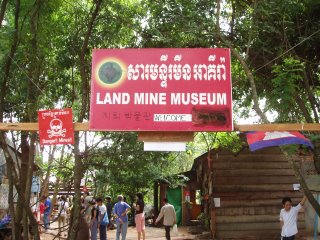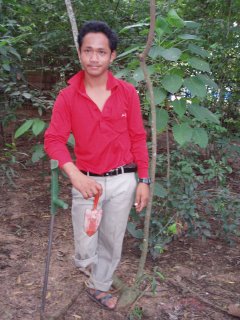After spending 5 days at BBLC, we moved on to Siem Reap City for touristy adventures (think buffet, shopping, massage!). But alas, God was not done… He had more to show and teach me.
Landmine Museum
We visited a landmine museum which was built and maintained by a man called Aki Ra. Here, we learnt more about Cambodia’s history and Aki Ra’s life & work – a man who has devoted his life to deactivating landmines in Cambodia. He was born during the war times and brought up as a child soldier for the Khmer Rouge but was later captured by and served the Vietnamese army. As a child, he was forced to lay many landmines around Cambodia. When the war was over, he received education and started to de-mine on his own. Aki Ra and his wife adopts and bring landmine victims (about 11 to-date) to live with them in Siem Reap where they go to school, learn English (& other languages like Japanese!) and help out at the museum as guides. Its very heartening to know that many foreigners visit the museum and take active steps to help Aki Ra – setting up a website, helping with donations, teaching English to the adopted kids, etc. 
landmine museum entrance The museum isn’t like our typical concrete, polished ones with nice glass casing and labels. Instead, it’s a makeshift attap-like one, with various handmade posters, paintings, stories pin up everywhere, together with large array of different weapons, landmines. There we watched a video which showed the various events leading up to current Cambodia, the state of landmine activity now and the lives of kids who have suffered from the effects of these.

our guide, Hak There was a portion of the video that really moved me to tears – where Aki Ra’s adopted kids were introduced one by one with their names (and obvious handicaps), all happy and grinning into the cameras. And the scene after that showed them having fun playing soccer, jumping into the river for swims, mucking around like normal teens. Its strange but that tugged at my heart as I marveled at how amazing it was that these kids, underprivileged in our eyes, take so much joy in life, are so very grateful they have a chance now to study, to grow to be useful adults. I wondered how our kids would be if they ever faced such a handicap, how I would be if I faced such a handicap – would it be the end of the world for us, or would we be strong and continue to embrace life like they have? Sobering and shaming at the same time… what right do we have to complain about our lives if they can live so well in theirs.
Facts (as far as I know at point of visit)
- 2-3 kids are injured/killed daily, around 1,000 a year
- 97% of landmine casualties are civilian
- There are approximately about 7 million mines still left at the Thai-Cambodian border
You can read more about the museum’s work and how you can help here www.akiramineaction.com & www.cambodialandminemuseum.org
Beatocello’s Concert

Another outstanding man in Siem Reap is a Swiss doctor, Dr Beat Richner. Dr Beat gives free cello concerts every Sat evening in a wonderful concert hall in Siem Reap City. He plays classical and self-composed pieces to tourists weekly and uses the session as a platform to raise awareness of the condition of children healthcare in Cambodia, the work that he is doing and to raise donations to support this work.
At the concert, I learnt many things about the poor state of hospitals and healthcare in Cambodia. In summary, Dr Beat attributes it to 3 main causes:
1) Corruption
The Cambodian healthcare system is inefficient and ridden with corruption. Healthcare providers are paid poorly (US$14/month) which leads to bribe-taking and poor patients not being granted admission unless they could pay. Healthcare workers also worked short hours, stole medicines etc to survive. All of which meant the poor (which would be 90% of Cambodians) do not get the medical attention they need and the kids die.
2) War The many years of war that Cambodia has gone through apparently resulted in dormant tuberculosis in majority of Cambodians. Dr Beat gave an approximated 65% figure as the proportion of children he thinks suffer from tuberculosis (dormant & otherwise). I’m no medical expert, but I understood that this fact meant that the Cambodians are more vulnerable to succumbing to minor ills and infections compared to other kids. It was also in Cambodia (due to his policy of effecting the right methods for the right issues regardless of costs) that infant tuberculosis was detected (a first in medical world).
3) Attitude of first-world countries
To my shock and horror, many reputed NGOs and first-world officials apparently subscribe to the belief that ‘poor medicine is good enough for poor people in poor countries’. According to this logic, they adhere that a country like Cambodia should not use modern technology like CT scans, blood labs to ensure clean blood transfusions. And medicines that are exported to Cambodia would be outdated ones (that may not work) not modern ones as Cambodians should get only what they can afford. According to Dr Beat, this policy amounts to passive genocide.
Of cos this idea is atrocious. Listening to Dr Beat, I realized how fallen our world is and one question kept ringing in my head
Is the life of a Cambodian child worth less than that of a first-world child?
Dr Beat was right. In Australia, Switzerland, Singapore, the UK, the US – would we spare any expense to save our child from an illness? Would we allow backdated methods/medicine to be used or to skip important steps in a blood transfusion exercise? Obviously not. Yet we deem it fit for the poor, just cos they are distant, ignorant, helpless. Shame on us.
Why are we so obnoxious and selfish, to only channel the right medicines to the ones that can afford it? I thought it through and realize it isn’t just the first-world governments or pharmaceutical companies that are guilty of perpetuating this error. It is common people like you and me that contribute to the problem.
Pharmaceutical companies would not give good medicine for charity (which is what giving to Cambodians would be cos they can’t afford much) because they operate for revenue. They operate for revenue because they have to answer to stakeholders, mainly shareholders of these companies. And shareholders of these companies would be individuals that own stocks, that demand high returns on their shares yearly. And these individuals could be anyone of us in the developed world.
Dr Beat was commissioned by the Cambodian king to build a children hospital that’s efficient and gives free healthcare. Over years of hardwork, he has now built three such hospitals in Phnom Penh and Siem Reap. Dr Beat pays his healthcare workers reasonably, trains Cambodians to work in the hospitals and grant free healthcare for all. When he first started the hospital it was run by a majority of foreigners. Now, he has successfully equipped the locals and these hospitals are run mainly by Cambodians (1,600 Cambodians, 2 Foreigners). He ensures the right equipment, methods are used to ensure safety of the kids.
Dr Beat face many challenges from the international community which I was ignorant of until that day. His work is sustained 90% by donations from tourists, people who attend his talks/concerts, the other 10% from his home country, Switzerland. Its appalling, but huge organizations (I shan’t name names) call on people NOT to give to Dr Beat cos they deem him a rebel and non-conformist to standards set internationally (basically in my opinion, they don’t like him cos he is spoiling the market). You can find out more by visiting his site www.beatocello.com or borrow the book I bought titled ‘Hope for the Children of Kantha Bopha’ by Dr Beat Richner.
At times like these, I wished I was either a trained doctor so I can help or a millionaire many times over so I can give more to these people. Preserving their lives is one step forward – that they will live long enough to know the gospel before final death comes.
_________________________
Though the realities of what I’ve seen, desire to serve there again is keen and strong now, I know the urban world with its comforts and complications can make these realities distant and mild in time. So I pray and trust Him to preserve and strengthen any desire of mine as He wills... pray with me :) |



